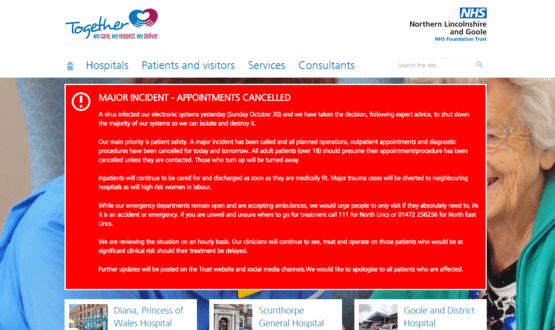Virus all but shuts down Northern Lincolnshire and Goole
- 31 October 2016

Northern Lincolnshire and Goole NHS Foundation Trust shut down the majority of its electronic systems on Sunday and cancelled all operations for the following two days after a computer virus was detected.
The trust has called a major incident and all planned operations, outpatient appointments and diagnostic procedures have been cancelled for today and Tuesday.
The trust says that it took the dramatic steps after seeking “expert advice” on a response, and that its main priority is to ensure patient safety.
In an unprecedented move, the trust put a red alert splash on its website with the following explanation:
MAJOR INCIDENT – APPOINTMENTS CANCELLED
“A virus infected our electronic systems yesterday (Sunday October 30) and we have taken the decision, following expert advice, to shut down the majority of our systems so we can isolate and destroy it.
“Our main priority is patient safety. A major incident has been called and all planned operations, outpatient appointments and diagnostic procedures have been cancelled for today and tomorrow.
“All adult patients (over 18) should presume their appointment/procedure has been cancelled unless they are contacted. Those who turn up will be turned away.
“Inpatients will continue to be cared for and discharged as soon as they are medically fit. Major trauma cases will be diverted to neighbouring hospitals, as will high risk women in labour.
While our emergency departments remain open and are accepting ambulances, we would urge people to only visit if they absolutely need to. We are reviewing the situation on an hourly basis.”
The trust adds that further updates will be posted on the website and social media channels. The red alert statement adds: “We would like to apologise to all patients who are affected.”
Northern Lincolnshire and Goole is a major provider, and runs a number of district general hospitals including Scunthorpe General, the Diana Princess of Wales Hospital in Grimsby, and Goole and District Hospital.
There is no information at the moment about the nature of the virus attack that has affected the three hospitals so badly. However, there has been growing concern about the possibility of a major hack on an NHS trust.
The US has seen a wave of so-called ransomware attacks on healthcare organisations, in which hackers lock-down systems and then attempt to extort money to restore them.
The NHS has set up a careCERT at NHS Digital to advise the health service on potential attacks and on best-practice for dealing with them.
At the recent Healthcare Efficiency through Technology show in London, NHS Digital's chief operating officer, Rob Shaw, said it had uncovered widespread and frequent attacks on the NHS, with ransomware a particular issue.
Old and unsupported software is also a concern, since this can be an entry route for attackers.
In July, reports from Dame Fiona Caldicott and the Care Quality Commission on information governance and security identified this as a particular issue, and said trusts should be funded to remove obsolete technology.




